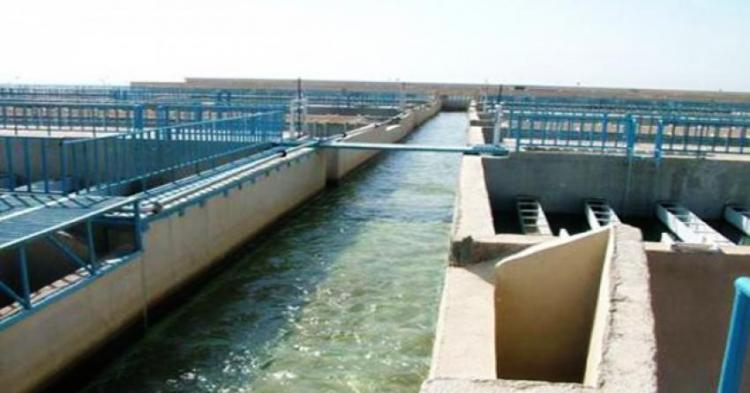Fatma Abdelhalim
HASAKAH, Syria (North Press) – A humanitarian catastrophe threatens a million and half people from the city of Hasakah and its countryside in northeastern Syria as a result of the Turkish forces politicizing water, using it to pressure Kurdish forces, without regard for international conventions and laws.
"Turkish forces cut off water from Hasakah city about a week ago, which led them to declare a state of emergency to face the crisis, and we called on other Autonomous Administration areas to help us if the situation continues in this way," co-chair of Hasakah’s Water Directorate Sozdar Ahmad told North Press.
Turkish forces have repeatedly cut off water from Alouk water station to the city of Hasakah and its countryside after they invaded areas in northeastern Syria and took control of the city of Sere Kaniye late last year.
Alternatives
Residents of Hasakah have been suffering from a complete lack of water since July 5, and were forced to rely on the limited availability of water that could be brought by water trucks.
Rok Haji, a resident of Hasakah, told North Press that “we two packages of mineral water to drink every day, which costs 2,200 SYP. As for cleaning, we fill household water tanks every three days by water trucks, which is undrinkable. It costs between 4,000 and 5,000 SYP. This is a financial burden we can’t deal with.”
A group of journalists and civil society activists launched an initiative aiming to dig a number of wells in poor and affected neighborhoods from water shortages, as well as Sere Kaniye’s IDP shelters.
Journalist Hibar Othman, one of the members of the initiative, told North Press that “we will help to dig wells in a number of poor and affected neighborhoods from water shortages, as well as Sere Kaniye’s IDP shelters, according to our capability. What we are doing is attempting to alleviate the suffering of our people in Hasakah."
In an attempt to alleviate the water crisis, the Directorate of Drinking Water in Hasakah announced in March that it will drill 50 wells at Hammeh station, northwest of Hasakah, with an implementation period of 29 days, as a major alternative to the Alouk station.
The co-chair of the Water Directorate in Hasakah Nidal Mahmoud told North Press that “20 wells of Hammeh station will be in service within less than a month, and it will be an alternative to Alouk station.”
"We got the necessary materials and equipment to equip the wells after the lifting of the lockdown, and the process of preparing the wells may take one month to enter the station into service and reduce the water problem in Hasakah,” he added.
Syria's share of the Euphrates
An agreement concluded between Syria and Turkey in 1987 stipulates a commitment for Turkey to provide a flow of water at a rate of 500 cubic meters per second to Syria. In 1994, Syria registered the agreement signed with Turkey at the United Nations to ensure the minimum amount of water.
Engineer Jihad Bayram, head of the Operations Room in Tishreen Dam, told North Press earlier that the water supply that crosses the Euphrates River does not exceed 200 cubic meters of water – less than a quarter of the internationally agreed-upon quantity.
Russian intervention and unclear international position
Officials from the Water Directorate in Hasakah met with a Russian delegation, who denied their knowledge about the water shortage.
Sozdar Ahmad told North Press, "the Autonomous Administration informed the Russian troops about the water cutoff, and the Russian response was that they held talks with Turkey without any results so far.”
On March 23, UNICEF Representative in Syria Fran Equiza said the interruption “during the current efforts to curb the spread of the coronavirus disease puts children and families at unacceptable risk.” Four days later, 49 Syrian civil society and human rights organizations also condemned the water interruption in a jointly signed statement.
“This intentional denial of water that the residents of these areas are suffering is a blatant violation of international humanitarian law and is a war crime,” the statement read.
The organizations called on UN agencies, as well as the United States and the European Union, to “pressure the Turkish government to allow the provision of water to deprived areas.”
Earlier in April, Human Rights Watch said that the failure of Turkish authorities to ensure adequate water supplies to areas of northeastern Syria was negatively affecting the ability of humanitarian organizations to provide aid to communities.
A report by the United Nations Children's Fund (UNICEF) warned that cutting off water to cities in northeastern Syria endangers the lives of about half a million people, especially as the world combats coronavirus.
The International Committee of the Red Cross warned of a worsening crisis in northeast Syria, where water cuts, food shortages and depleted health services are proving as dangerous as coronavirus.
Turkey's argument and condition
Under Russian mediation, Kurdish-led authorities in northeastern Syria have been providing electricity to Turkish-occupied areas in exchange for water flow, but Turkish-backed groups have continued to repeatedly cut off water, demanding higher levels of power.
A Syrian Government delegation and the Syrian Red Cross International committee held a meeting with the Autonomous Administration’s Water Directorate in Hasakah city on Turkey's interruption of water, and told them that Turkey's condition to resume the flow of water to Alouk station permanently is the removal of the SDF from Hasakah.
Turkey rarely pumps water from the station, but in very small quantities. The temporary return of pumping to the station does not mean that the water crisis is solved, as there is no agreement at the moment.
(Editing by Lucas Chapman)

